October 2019 Buyer's Share Report
RailSplitter Wind Farm provided the October 2019 Buyer's Share amounts by hour, totaling 2,329.1 Megawatt hours. See attached file.

RailSplitter Wind Farm provided the October 2019 Buyer's Share amounts by hour, totaling 2,329.1 Megawatt hours. See attached file.
Hello ECIP winners,
When the Energy Conservation Incentive Program (ECIP) was launched in 2013, it included financial awards that distributed some of the centrally managed campus utility funds back to the winning buildings. The calculation system was based on placement (first place to fourth place) in the awards program and the award category (occupant action or energy advancement). You can see the calculation in the attached fact sheet from 2016, if you are interested. With the Integrated and Value-Centered Budget (IVCB) reform, we transitioned this year, and we are closing out the initial phase one of the ECIP.
Some of the original award funding has not yet been allocated to an associated facility improvement project. If you have remaining funds and have not yet committed to a specific project, please do so as soon as possible. All ECIP award funds must be committed by the end of this fiscal year, so please let us know your plans.
Now in phase two, the ECIP awards include a plaque and the associated prestige, and no additional monetary awards (see attached revised fact sheet). Instead, your colleges will benefit directly from the energy savings. Additionally, to increase the visibility of the great progress all of you have made, we are collaborating with the Illinois Solar Decathlon’s Concept Team (incoming freshmen, learning about building systems and sustainability). They will be completing a simple Building-Level Energy Report card for the 50+ ECIP winners this fall. In the spring, I will send those reports to you with an opportunity to connect with the Concept Team members.
Later this week, I will send a follow up email to the FY19 winners with images to help you spread awareness of this award. Congratulations again to all of you, and thank you very much for your past and ongoing contributions to the campus sustainability and energy efficiency efforts.
Sincerely,
Morgan
All, Last week was productive! We continued counting everything and made some real progress cleaning up here at the shop. I’ll be doing a walk-through this week with TBP on what to keep and not keep. I went to the bike barn and counted bikes: We’ve got 277 to donate to Working Bikes and 56 to keep. Those numbers are rough counts and not exact. Things are relatively organized over there now. Once we set a date for them coming down I’ll move all the bikes we want to keep out of there. Fingers crossed for an easier go of it this time around!
This Thursday we have our Fix-a-Flat class at 11am. Doubtful turnout will be great. It is November, after all.
On Saturday the Bike Project is hosting a bicycle food drive. All donations go to Eastern Illinois Foodbank, and we’ll be promoting that over here at the Bike Center. It’s a fun event I’ve participated in for years.
This week we’ll keep paring down our stock and keep cleaning up in advance of our TBD move!
The numbers:
Visitors: 61
Sales: $527
Bike (refurb): 1 for $170
Memberships: 2 for $60
Tires/tubes: 10 for $53
Thanks!
Jacob Benjamin
Manager, Campus Bike Center
This article in today’s News-Gazette addresses net square footage on campus, which is squarely in the portfolio of our committee. It has been a concern of iCAP since its inception in 2008. It is also one of two items called out in the charge letter for our committee for this year.
I consider our obligation as a committee is to address the issue seriously within our committee and within the iCAP process, in order to effect change in campus growth. Any of us may of course, as citizens, engage the public dialogue on this issue. With this email I’d just like to bring everyone up to speed on the work of our committee last year. See slides 2 through 7 in the attachment.
I don’t know that we need to do anything differently, given the public airing of this issue. I’d like to hear from others on the committee on this matter.
Bill Rose
Hi Pete and Shawn--
There were no zero waste activities this past week.
Best regards,
Marya Ryan
Please see the numbers below for the month of October 2019. ~400 e-bikes and ~75 pedal bikes
October:
Total Rides – 37,443
Total Users gained – 1,281
Average Ride Time – 8.76 Minutes
Overall:
Total Rides: 375,147
Total Users:19,749
Reporting:
Events: We were a sponsor for the Aruna 5k on Oct 26th. We provided 250 coupons good for $2 of ride credits
Attached is the final draft of the recommended 2020 iCAP objectives from the Transportation SWATeam.
Any meeting minutes from October 2019 or November 2019 may reference the following categories: Reduce the Number of Cars on Campus, Increase LEV Use, Decrease Business Travel Emissions, Road Management Systems, and Increase Active Mode of Travel/Active Transportation. Please refer to this document for any details.
There will be a revised version by the end of the 2019 Fall Semester after iWG gives feedback for the SWATeams to revise.
Attached is the final draft of the recommended 2020 iCAP objectives from the Zero Waste SWATeam.
Any meeting minutes from October 2019 or November 2019 may reference the following categories:
There will be a revised version by the end of the 2019 Fall Semester after iWG gives feedback for the SWATeams to revise.
The 31 October Transportation SWATeam was solely to finalize the objectives which were submitted to the iWG for feedback. Those objectives can be found here on the iCAP portal.
Reached out to Sam Smith and Lisa Lillig at the Krannert Center for the Performing Arts (KCPA). Informed them about the event, and requested a meeting to discuss the event in more details. This event was planned to be open for faculty, staff, and students. The event was planned to be held at the end of November and first week of December.
Here are some resources for estimating carbon sequestration from various plants:
There is a LEED green associate training program offerred on campus at https://leadinggreen.com/Illinois/.
The University has been recognized for winning the Freezer challenge for a second year in a row, in the magazine Nature. Click the link to go to the site! https://www.nature.com/articles/d42473-019-00288-0
A cool competition for sustainable labs
Laboratory refrigeration requires a surprising amount of energy. Since 2017, the International Laboratory Freezer Challenge has pushed labs to reduce their draw.
Produced by
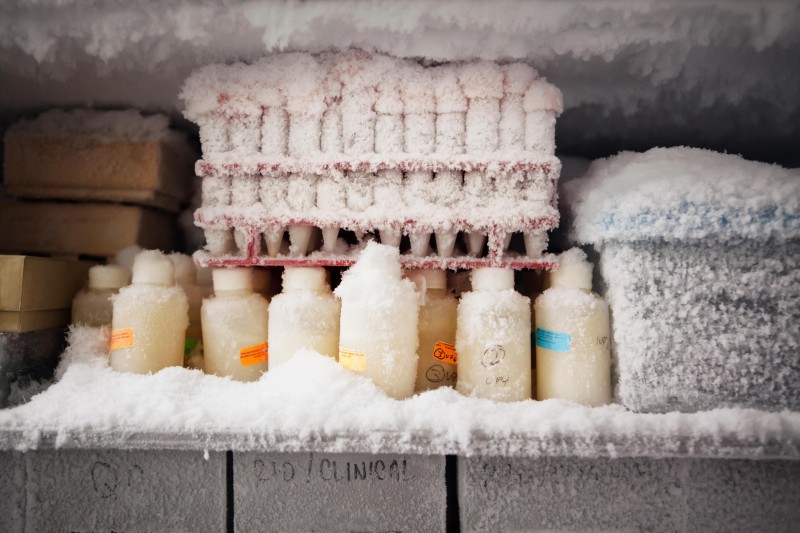
Inefficient freezers waste energy and money.Credit: Cavan Images/ Alamy
For scientists, a good freezer is like a good colleague: integral to doing your best work. But cooling comes at a great cost. Ultra-low temperature freezers, which usually store samples at –80°C, can use as much energy as an average household, and more as they get older. Multiplied by hundreds of thousands of units in labs around the world, that humble lab freezer has quite an energy footprint.
In 2017, My Green Lab and the International Institute for Sustainable Laboratories (I2SL) created the International Laboratory Freezer Challenge* to inspire labs around the world to reduce energy used for cold storage, from refrigerators to the coldest freezers. Individual labs or organizations complete a scorecard detailing the implementation of best practices and energy-saving processes: good management practices, including defrosting freezers; temperature tuning, such as setting a freezer at –70°C or higher; retiring unused refrigerators/freezers or replacing them with more efficient ones; and some unexpected improvements, such as storing certain samples at room temperature.
Labs receive points for every action that they take. In four categories, academia, the biopharma industry, hospitals and government/non-profit, individual labs and organizations that accumulate the most points win. There can be eight winners, all of whom receive an award and recognition in Nature. This year, awards were given to labs and organizations in three of the four categories.
“The number of participating labs in 2019 nearly doubled from 2018,” says Allison Paradise, CEO and founder at My Green Lab, bringing the number of entrants worldwide to about 400 this year.
Organizational winners
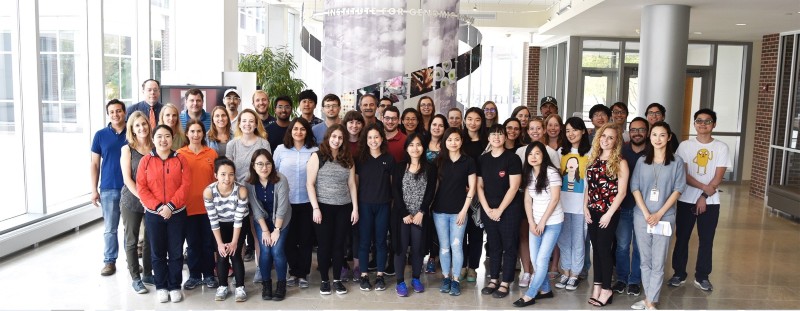
University of Illinois, Urbana-Champaign winning team Credit: University of Illinois
In a repeat of 2018, the University of Illinois, Urbana-Champaign, took the top spot among academic organizations by saving about 160,000 kilowatt-hours (kWh) per year. To win as a university, Madeline Barone, an undergraduate studying environmental science who organized the effort, made it her mission to get as many labs as possible involved. “Following up with people was super important,” she says.
Teamwork also made a big impact in the biopharma-organization category. Charles River — a global, preclincal contract research organization and headquartered in Wilmington, MA — registered all its sites around the world for the competition and encouraged them to compete against each other.
“This led to one of the most meaningful reductions in energy consumption and greenhouse-gas emissions we’ve ever seen,” Paradise says.
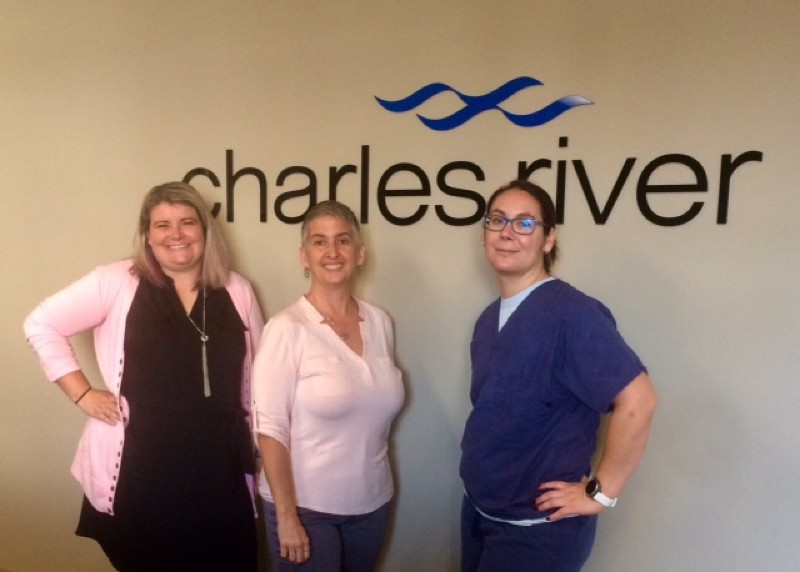
Winning team from Charles River
Charles River, Mattawan (MI), took the top spot. “We entered to see where we stood in relation to industry standards,” says neurobehavioral scientist, Rachel Tapp. The team ended up learning a lot. “Our sustainability crew is new within our Charles River site,” Tapp explains. “So, we learned much about who manages these systems and how they were managed.” Charles River, Mattawan saved about 423,000 kWh a year.
Rounding out the organizational winners, the U.S. Centers for Disease Control and Prevention (CDC) earned a threepeat in the government/non-profit category. Even after wins in 2017 and 2018, the CDC added an estimated saving of 300,000 kWh a year.
Individual winners
Among individual laboratory winners, the Multiple Sclerosis and Parkinson’s Tissue Bank at Imperial College London took the top academic spot. To do that, says tissue bank manager George Gveric, “We increased the temperatures on all our freezers and rearranged samples so that freezers are opened less frequently.”
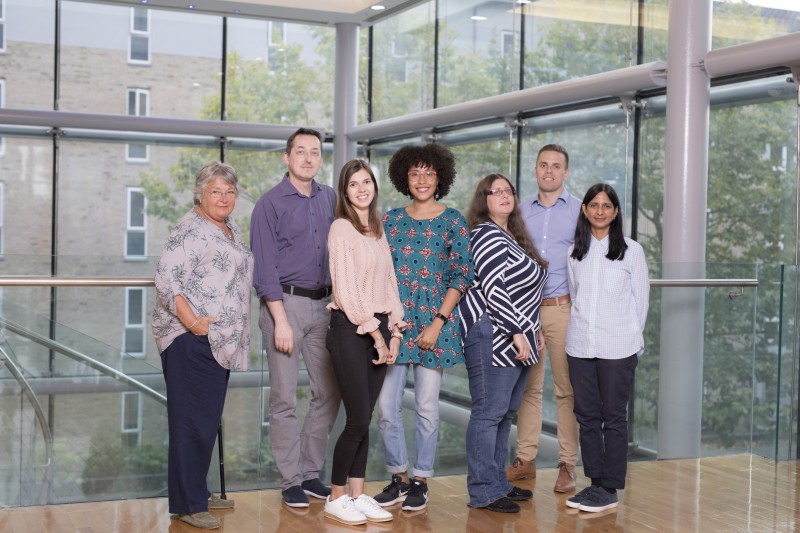
Winning team at Imperial college London
The top honor in the biopharma industry category for an individual lab went to Amyris Biology/Automated Strain Engineering Lab. The start-up is based in Emeryville, CA. Senior associate scientist, Gloria Sagala calls the Freezer Challenge “a great opportunity for our team to come together around a common goal to improve our energy efficiency with our cold storage.” Sagala and her colleagues removed inefficient and unnecessary freezers and implemented a system to track defrosting, saving the lab 30–40% in freezer energy.
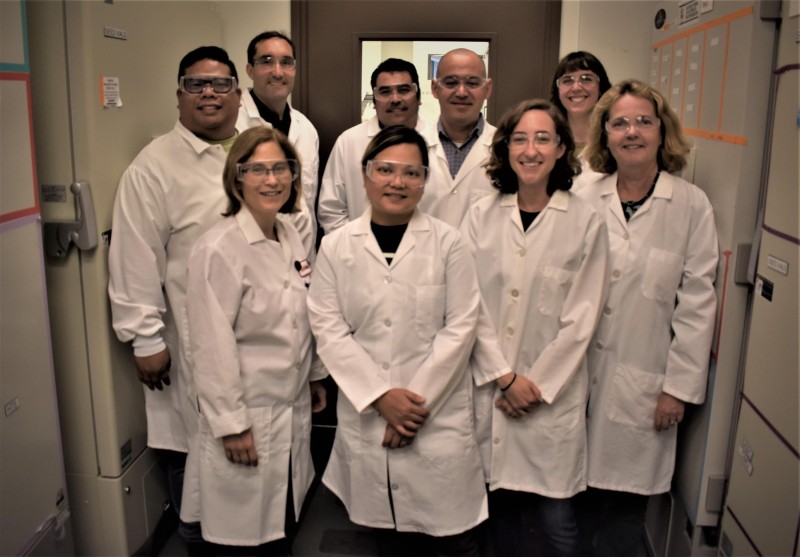
Amyris Biology/Automated Strain Engineering Lab winning team Credit: Amyris Biology/Automated Strain Engineering Lab
An individual lab winner in 2018, the Inorganic and Radiation Analytical Toxicology Branch of the U.S. Centers for Disease Control and Prevention (CDC) teamed up with the Clinical Chemistry Branch to take the individual government/non-profit lab category. “We keep entering because we keep trying to increase awareness of energy use for cold storage in our division,” says Deanna Jones, a team leader in the CDC’s Division of Laboratory Sciences. When asked about the biggest change this year, Jones says, “We have begun buying ENERGY STAR-rated freezers to replace old, less energy efficient ones.”
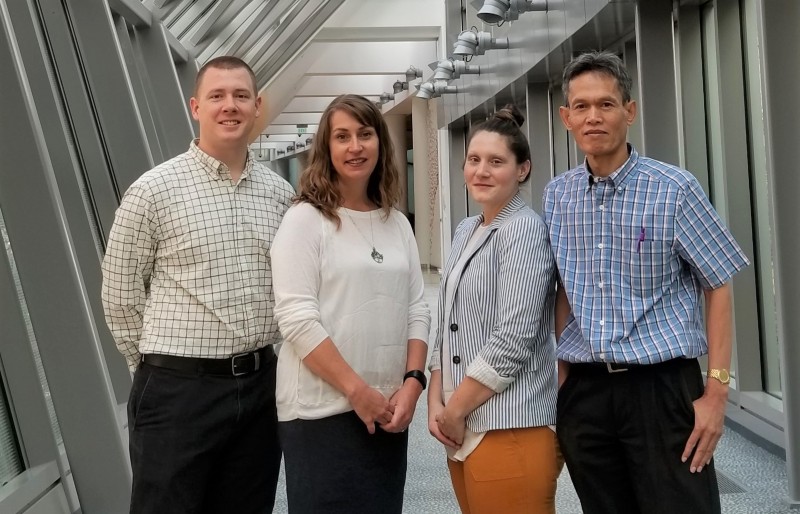
CDC winning teamCredit: CDC
Overall, the combined efforts of participants in 2019 saved about 2.4 million kWh a year. That’s enough energy to power more than 230 average American homes for a year.** Freezer Challenge organizers hope to see that number double again in 2020.
Organizational honorable mention:
• Charles River Laboratories, Leiden
• University of North Carolina at Chapel Hill
• US. National Institutes of Health
Individual-laboratory honorable mention:
• Janssen Immunology Biology Lab at La Jolla, CA, led by Steven Nguyen
• Laboratory Research & Reference Branch, Division of STD Prevention, CDC
• Ming Lab, University of Illinois, Urbana-Champaign, managed by Julie Nguyen

*The Freezer Challenge is made possible through the generous support of sponsors, including 2019’s Gold Sponsors Eppendorf and PHCbi.
All, Steady week, surprisingly. We even had a waiting list one day. Generally, though, things have slowed down. We’re still getting our inventory tallied up. We’ve got 6 bikes for sale with a few more to come.
Last week I counted and moved bikes around at the warehouse. I’ll be doing more of that this week with the help of some of my student staff. I have reached out to Working Bikes about coming down to collect our unusable bikes. I’ll have a better idea of just how many bikes that’ll be after this week.
This week we’ll be keeping on with the inventory/pitching junk, organizing the parts we keep, building up the good bikes, and the aforementioned warehouse bike fun.
The numbers:
Sales: $318
Memberships: 5 for $150
Tires/tubes: 8 for $30
Thanks!
Jacob Benjamin
Manager, Campus Bike Center
The 22 October meeting was a finalization to the 2020 iCAP October Final Objectives from the Zero Waste SWATeam. Please reference the document submitted to this page on the iCAP portal.
The Illinois Wanxiang Fellows Program is a competitive program open to U of I undergrad students at the Urbana, Chicago, and Springfield campuses. The program offers a unique opportunity for students to study environmental issues and renewable energy in China while gaining exposure to the Chinese language and culture. Most travel & program costs are covered. https://go.illinois.edu/wanxiang
Yu Chuan Shen • Center for East Asian and Pacific Studies
Apply by Nov 1 for Wanxiang Fellows Program (Sustainability in China)
All rechargeable batteries that are received through the campus waste program are recycled. The campus community must submit an online waste request through the DRS waste application to have their rechargeable batteries picked up and recycled.
I would be happy to answer any additional questions you may have.
Thanks.
LANDON HILL
Chemical Waste Manager
Division of Research Safety
Hi Pete and Shawn--
This past week, I had a phone conversation with Meredith Moore about composting on campus. I also reviewed the Zero Waste SWATeam iCAP recommendations and submitted a comment regarding the need for transportation resources for departments to enable them to move recyclable materials to centralized collection/drop-off points.
Best regards,
Marya Ryan
Using the BRC solar energy dashboard at https://smart.tigoenergy.com/p/itisolartestbed/system/charts, we collected the monthly data for the solar array. Because only a portion of the array is on the dashboard, we extrapolated the total energy production. The FY19 production was 21,007 kWh.
Attached are the meeting minutes from the 24 October Transportation SWATeam meeting.
Stacey DeLorenzo was able to join us in order to provide insight to the Road Management Objectives the SWATeam discussed earlier, and to answer questions. She also was able to take a look at other objectives and provide input on potential objective ideas.
The SWATeam confirmed submittal of Road Management, Active Transportation, and Business Travel Emissions objectives and added a new objective under Reducing Business Travel emissions.
The next meeting is 31 October 2019.